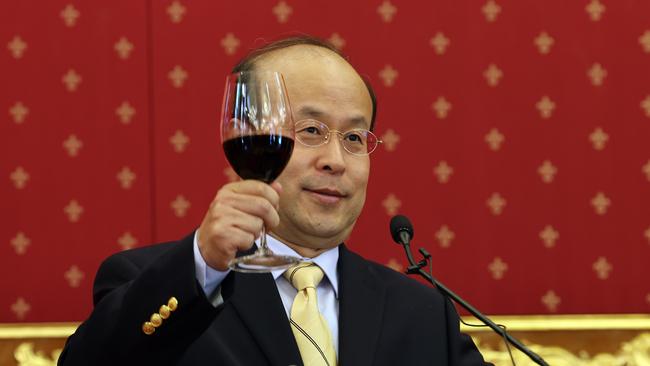Australian wine back on the menu as China to remove tariffs
China’s Ministry of Commerce has issued a ‘draft determination’ to remove tariffs on Australian wine which have killed a market once worth some $1.2bn a year.

The Australian wine industry is one step closer to reclaiming access to the China market and more than $1bn in annual sales after the Chinese Ministry of Commerce released an interim draft determination that proposed a lifting of crippling tariffs on Australian wine imports.
The largest exporter of Australian wine, ASX-listed Treasury Wine Estates, whose labels include Penfolds, Pepperjack and Wolf Blass, said on Tuesday night it had been advised of the draft determination.
It noted it was not a final determination and was “subject to change” by the ministry.
China introduced tariffs of up to 200 per cent on imports of Australian wine in 2021, a move widely seen as part of a range of trade sanctions against Australia in the wake of political tensions with the Morrison government.
The tariffs decimated the $1.2bn wine trade to China and forced many winemakers to look elsewhere as the largest global market was shut down.
It also left many Australian winemakers, part of a $45bn sector, with excess stock as the massive tariffs made it uneconomic to sell into China.
Australian Grape & Wine welcomed the interim decision, with its chief executive Lee McLean describing it as a positive step towards resuming trade.
“We remain cautiously optimistic about the forthcoming decision and will await (the ministry’s) final determination,” Mr McLean said.
The draft decision comes after Australia and China both agreed to private discussions about the tariffs following an interim determination by the World Trade Organisation last year following a complaint by Australia.
The move comes ahead of a planned visit that could come as early as next week by China’s Foreign Minister, Wang Yi, who is expected to visit Sydney and Canberra on a two-day visit.
TWE said it expected that a final determination would be issued regarding tariffs on Australian wine imports by the end of the month. The company has maintained a foothold in the China market in recent years by sending wine made in the US and France to China and supporting the development of the Chinese wine industry, including production of a Chinese-made Penfolds released last year.
The company’s chief executive, Tim Ford, has maintained a confidence in the future of the China market despite the tariffs.
He told investors at the company’s half-yearly results in February that the company was holding back some supplies to be ready to reenter the China market with Australian wine if the tariffs were lifted.
The company has maintained a staff in China of some 100 to maintain its exposure to the market in the hope that tariffs would be lifted.
The news should give a boost to a large number of smaller wine makers who have suffered from the closure of the China market.
TWE said it expected that the financial benefits of any new access to the China market would be “incremental” in the current financial year to the end of June.
Mr Ford is expected to ramp up sales of Australia-made wine once the tariff outlook is clearer.
The move on wine tariffs followed a decision by Chinese authorities to lift tariffs on imports of Australian barley last year following a review by the WTO. Trade restrictions on exports of Australian coal, timber and cotton have been lifted over the past year following an improvement in the Australia-China relationship under the Albanese government.
Ministry of Commerce spokesman He Yadong said Beijing was proposing a “package” deal to end the dispute. “We are willing to meet the Australian side halfway, further enhance mutual trust and co-operate on the basis of the settlement of the barley case dispute,” he said last year, according to a report in China’s official newsagency Xinhua. The Chinese government spokesman said both countries needed to “accommodate each other’s concerns”, urging Canberra to note that “China’s wine industry is very important”.
Minister for Agriculture Murray Watt said the interim recommendation to remove tariffs is good news for Australian wine growers and makers.
“While today’s development is welcome, we will keep advocating for the removal of remaining trade impediments for Australian producers and processors,” he said.
Additional reporting: Will Glasgow







To join the conversation, please log in. Don't have an account? Register
Join the conversation, you are commenting as Logout